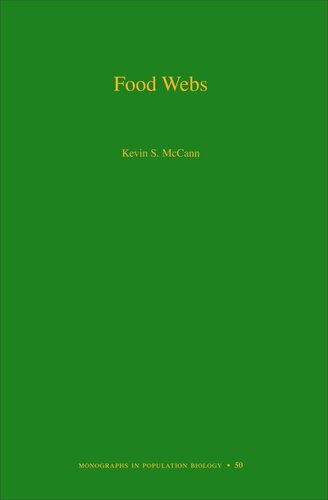

Most ebook files are in PDF format, so you can easily read them using various software such as Foxit Reader or directly on the Google Chrome browser.
Some ebook files are released by publishers in other formats such as .awz, .mobi, .epub, .fb2, etc. You may need to install specific software to read these formats on mobile/PC, such as Calibre.
Please read the tutorial at this link: https://ebookbell.com/faq
We offer FREE conversion to the popular formats you request; however, this may take some time. Therefore, right after payment, please email us, and we will try to provide the service as quickly as possible.
For some exceptional file formats or broken links (if any), please refrain from opening any disputes. Instead, email us first, and we will try to assist within a maximum of 6 hours.
EbookBell Team

4.7
46 reviewsHuman impacts are dramatically altering our natural ecosystems but the exact repercussions on ecological sustainability and function remain unclear. As a result, food web theory has experienced a proliferation of research seeking to address these critical areas. Arguing that the various recent and classical food web theories can be looked at collectively and in a highly consistent and testable way, Food Webs synthesizes and reconciles modern and classical perspectives into a general unified theory.
Kevin McCann brings together outcomes from population-, community-, and ecosystem-level approaches under the common currency of energy or material fluxes. He shows that these approaches--often studied in isolation--all have the same general implications in terms of population dynamic stability. Specifically, increased fluxes of energy or material tend to destabilize populations, communities, and whole ecosystems. With this understanding, stabilizing structures at different levels of the ecological hierarchy can be identified and any population-, community-, or ecosystem-level structures that mute energy or material flow also stabilize systems dynamics. McCann uses this powerful general framework to discuss the effects of human impact on the stability and sustainability of ecological systems, and he demonstrates that there is clear empirical evidence that the structures supporting ecological systems have been dangerously eroded.
Uniting the latest research on food webs with classical theories, this book will be a standard source in the understanding of natural food web functions.